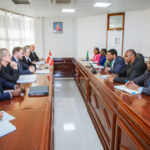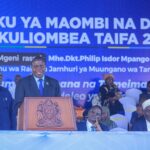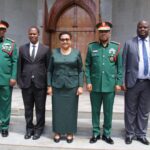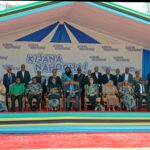The objective of this study is to examine the potential for collaborative tax policy reform. Tanzania’s Inclusive Approach to the 2024/2025 Central Government Budget
In a pioneering initiative to refine tax policies and stimulate economic growth, Tanzania’s Minister of Finance, Hon. Dr. Mwigulu Nchemba, convened a pivotal meeting with key tax stakeholders. This assembly, which included representatives from both the government of Tanzania Mainland and Zanzibar, as well as the private sector, constituted a significant step towards the enhancement of the nation’s fiscal framework. The discussions, which spanned two days, were conducted with the objective of aligning tax policies with the anticipated Central Government Budget for the 2024/2025 financial year. The forthcoming budget, which is scheduled for presentation to Parliament in Dodoma in June 2024, has been the focus of this collaborative effort.
Background:
The Tanzanian economy, like many others, is susceptible to fluctuations in the global economy, which can result in a shift in the country’s economic position. In light of the necessity for a robust and adaptable tax system, the government has endeavoured to engage a diverse range of stakeholders in the budgetary process. This approach is not only reflective of a democratic ethos but also ensures that the policies formulated are comprehensive and considerate of the diverse economic landscape of the nation.
The Meeting:
The convening of the tax think tank by Hon. Dr. Mwigulu Nchemba is indicative of the government’s commitment to inclusivity and transparency. The meeting constituted an opportunity for an open dialogue between the government and the private sector, during which the current tax policies could be examined in detail and their impact on various sectors of the economy could be evaluated.
Over the course of two days, participants engaged in constructive discussions, sharing insights and proposing amendments that could lead to a more equitable and effective tax system. The discussions were characterised by a spirit of cooperation, with the common goal of identifying strategies that would stimulate economic growth and enhance revenue collection without imposing undue burdens on businesses and citizens.
Key Areas of Focus:
The stakeholders’ meeting addressed a number of crucial aspects of tax policy, including, but not limited to:
- The objective is to broaden the tax base to include informal sectors without stifling their growth.
- The simplification of tax codes is intended to reduce the costs associated with compliance and to encourage voluntary compliance.
- The implementation of modern technology is intended to enhance the efficiency of tax administration.
- It is necessary to address tax evasion and avoidance in order to ensure a fair playing field for all businesses.
- The impact of tax incentives on investment and economic development is to be evaluated.
- It is also necessary to consider the harmonisation of tax policies between Tanzania Mainland and Zanzibar in order to create a more unified economic environment.
Outcomes and Approvals:
The meeting of the tax policy think tank concluded with a resounding endorsement from all members. The participatory nature of the budget preparation process was particularly lauded, as it allowed for a multitude of perspectives to be considered. The stakeholders expressed their gratitude for the government’s willingness to consider their input and integrate it into the upcoming budget.
The recommendations presented at the meeting are anticipated to exert a pivotal influence on the formulation of the Central Government Budget for the 2024/2025 financial year. By adopting a collaborative approach, the government of Tanzania has set an example for future policy-making endeavours, demonstrating that collective wisdom can lead to more effective and sustainable outcomes.
Conclusion:
As Tanzania prepares for the reading of the Central Government Budget in June 2024, it can take pride in the steps taken to ensure that the process is inclusive and reflective of the needs of all economic actors. The proactive engagement of stakeholders in the tax policy reform process is indicative of a maturing democracy and a forward-thinking government. The insights and contributions from the recent tax think tank meeting have positioned Tanzania to implement a budget that not only addresses the immediate fiscal needs but also lays the groundwork for long-term prosperity.
The success of this initiative serves as a model for other nations, demonstrating the advantages of participatory governance and the efficacy of collective problem-solving. As Tanzania continues its trajectory of economic development, the insights gained from this collaborative approach to tax policy reform will undoubtedly contribute to the nation’s narrative of progress and resilience.
Abbas J
- Kanyala Ferry Launch: TEMESA’s New Service for 15,000 Sengerema Residents (Mwanza) - 18 August 2025
- Russia-Tanzania Naval Cooperation: How the Smolny Training Ship Boosts Dar es Salaam’s Maritime Security - 18 August 2025
- Tanzania’s ICGLR Commitment: Stabilising the DRC & Great Lakes Region - 18 August 2025




























